Broadcom has announced the general availability of VMware Cloud Foundation (VCF) 9.0, marking a significant update to its private cloud platform for enterprise customers. VCF 9.0 is designed to unify operations across private data centers, edge locations, and managed cloud infrastructure from service providers and hyperscalers. By integrating the agility and scalability of public cloud with the security, performance, and cost advantages of on-premises environments, VCF 9.0 aims to support a wide range of hybrid and private cloud strategies.
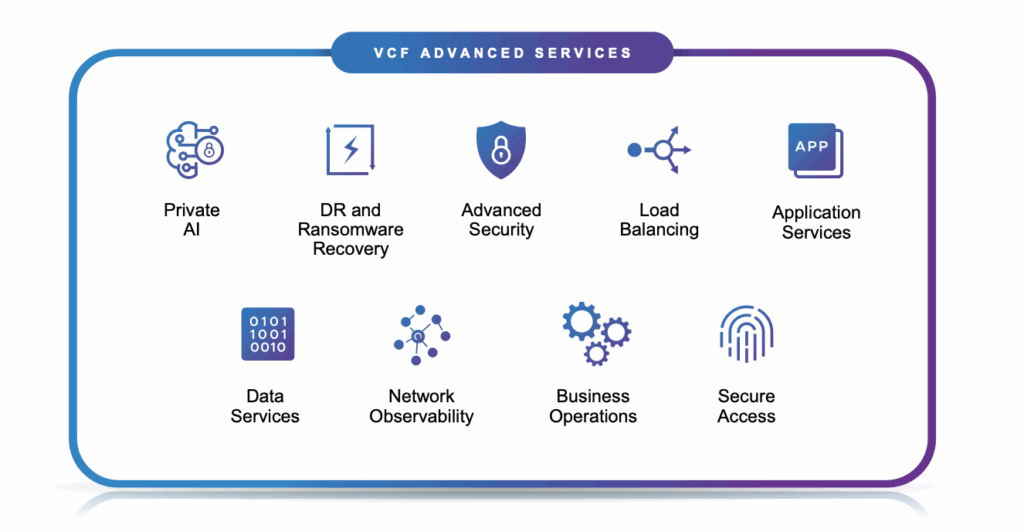
Unified Platform for All Workloads
VMware Cloud Foundation 9.0 offers a single, integrated platform that supports traditional, modern, and AI-driven applications. This unified approach ensures consistent operations, governance, and controls across the private cloud environment. The platform is designed to accelerate innovation by providing out-of-the-box self-service capabilities and a consistent user experience, enabling development teams to concentrate on application delivery instead of infrastructure management.
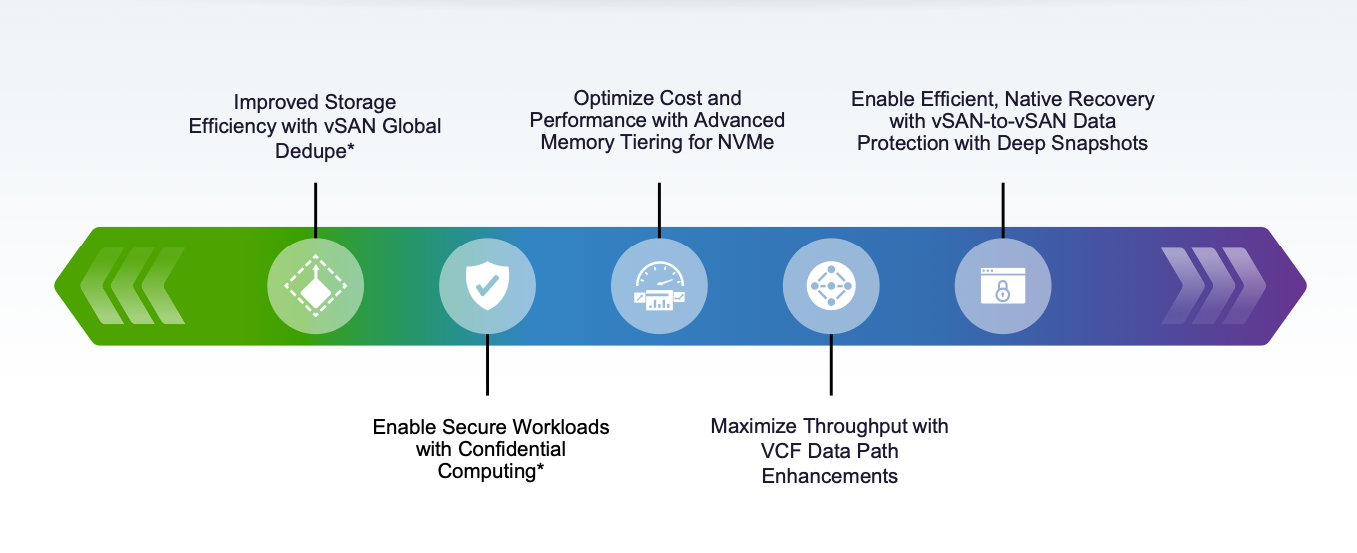
VCF 9.0 also enhances visibility into resource usage, allowing organizations to optimize cloud spending through improved planning and predictive analytics. Enhanced data control and compliance features support cyber resilience at scale, with fleet-level management tools that simplify patching, security updates, and policy enforcement.
Krish Prasad, Senior Vice President of the VCF Division at Broadcom, highlighted that VCF 9.0 simplifies deployment and operations, making it easier for enterprises to manage both mission-critical and next-generation workloads, including AI and containerized applications. Prasad noted that adoption rates for VCF have exceeded expectations across organizations of all sizes.
Architectural Advancements
The new release features a completely redesigned architecture, intended to empower IT administrators and application teams to achieve more with less effort and cost. VCF 9.0 simplifies the process of building, operating, and securing a modern private cloud across on-premises data centers, hyperscaler environments, and edge locations. The platform is specifically designed to decrease friction between infrastructure and application teams, facilitating seamless collaboration and operational efficiency.
Centralized Cloud Operations
A key feature of VCF 9.0 is its unified interface for cloud administrators, which provides a comprehensive view of private cloud operations. The new Quick Start App reduces setup time and complexity, while integrated cost management and policy enforcement ensure compliance and operational efficiency from the outset. Scalable fleet management capabilities allow administrators to plan, schedule, and execute upgrades across clusters, enhancing productivity. Centralized identity and access management, including single sign-on and robust password policies, ensures consistency across environments. Consolidated log management and advanced analytics provide rapid insights, enabling targeted responses for enhanced security and performance optimization.
The VCF 9.0 unified interface for platform and development teams simplifies the delivery and consumption of infrastructure services. Platform teams can organize, provision, and manage tenant resources with fine-grained control, while streamlined administration ensures secure, role-based access for both administrators and tenants. Built-in governance policies and pre-configured blueprints help maintain compliance and repeatability, reducing manual tasks. Developers benefit from automated, elastic self-service IaaS capabilities, delivering a cloud-like experience within the private cloud.
Unified VM, Container, and Kubernetes Platform
With the embedded vSphere Kubernetes Service (VKS), VCF 9.0 enables organizations to manage virtual machines and containers as first-class citizens. This unified approach allows customers to build, deploy, and run Kubernetes and virtualized workloads together, reducing the need for complex DevOps stacks and integrations. IT teams can maintain security and consistency, while developers can begin building and deploying applications immediately. The single operational model supports VM-based applications, cloud-native workloads, AI/ML applications, and traditional enterprise databases.
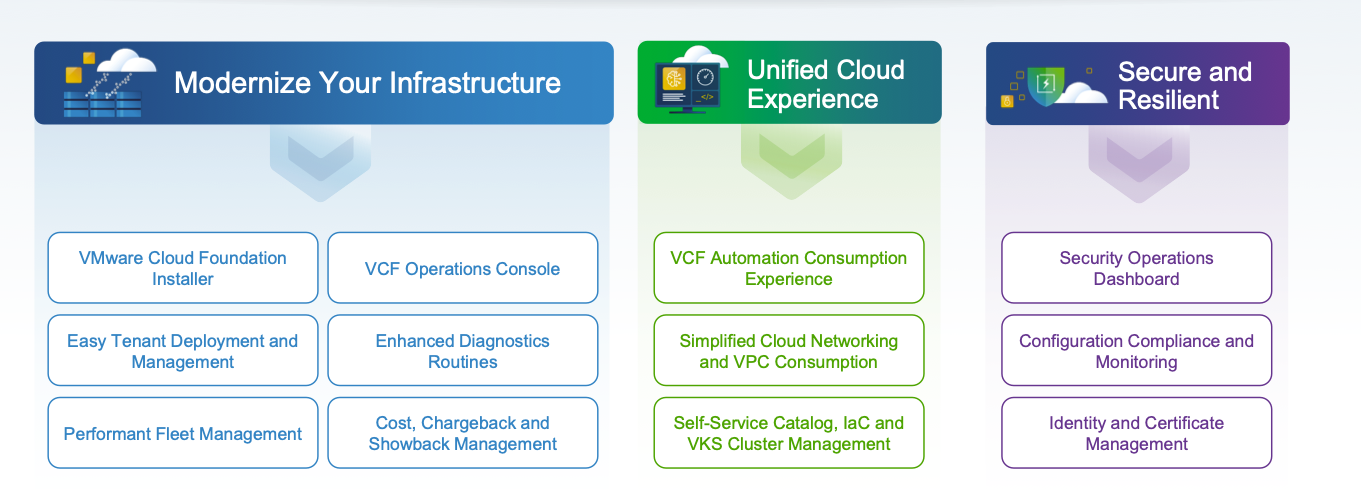
The platform provides comprehensive insights into infrastructure, software licensing, operational expenses, and data center costs, offering organizations a complete view of the total cost of ownership. Built-in analytics support predictive cost modeling for effective infrastructure planning and forecasting, helping organizations avoid unexpected financial challenges. Automated resource optimization dynamically reclaims underutilized capacity, improving workload efficiency and preventing unnecessary infrastructure sprawl. Detailed showback and chargeback data offer clear visibility into infrastructure ROI.
Security, Sovereignty, and Compliance
The new SecOps dashboard offers a consolidated view of platform security and data controls, featuring integrated compliance policies and regulatory guardrails for consistent governance. Support for the latest confidential computing technologies from AMD and Intel enables secure enclaves, encrypted memory, and attestation capabilities, allowing organizations to deploy confidential workloads across diverse infrastructure while maintaining consistent security policies and workflows.
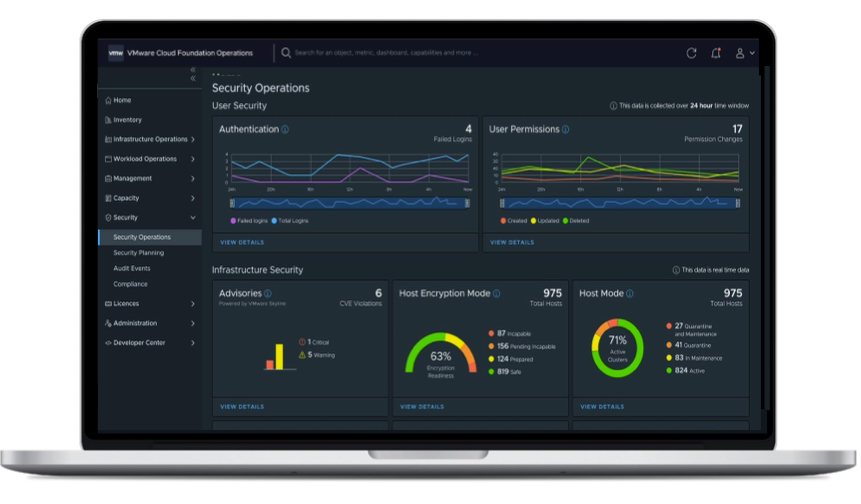
Core Features
Built on industry-leading compute, networking, and storage technologies, VCF 9.0 introduces several innovations designed to deliver measurable value to customers. Advanced Memory Tiering for NVMe can reduce memory and server TCO by up to 38%. VMware vSAN ESA with Global Dedupe can lower storage TCO by 34%. The enhanced VMware NSX data path offers up to three times the switching performance, maximizing throughput. New vSAN-to-vSAN data protection with deep snapshots enables efficient, native recovery from disasters or ransomware attacks. As a platform for modern AI applications, VCF provides near-zero performance overhead compared to bare metal and supports zero-downtime vMotion for AI workloads.
Expanded Advanced Services Portfolio
Broadcom expanded its advanced services portfolio for VMware Cloud Foundation. It now offers ready-to-deploy solutions that help enterprises accelerate innovation in private cloud environments. These services provide the flexibility and capabilities typically associated with public cloud, enabling rapid adoption of new tools and technologies.
vDefend
Enhancements to vDefend for VMware Cloud Foundation (VCF) 9.0 accelerate lateral security for all VCF applications. These enhancements address the growing need for private cloud security, driven by concerns around cost, predictability, AI workloads, lateral threat propagation, and compliance.
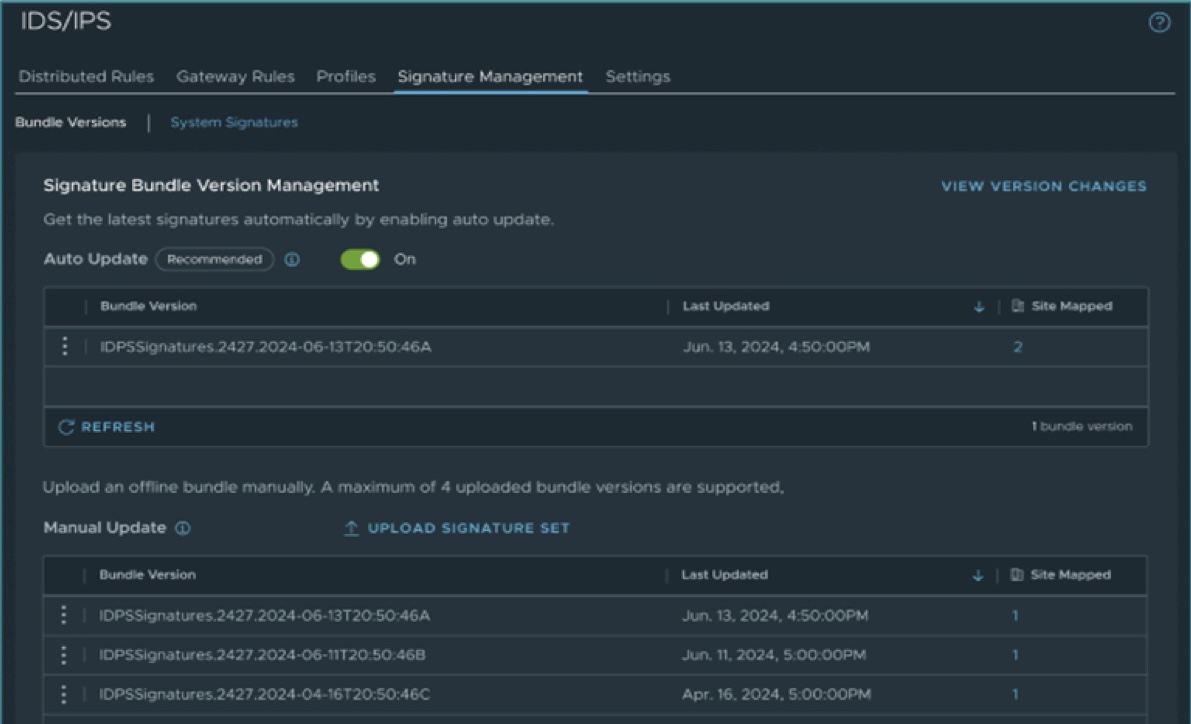
Key updates to vDefend include:
- VPC-Aware Lateral Security: This feature enables the implementation at the Virtual Private Cloud (VPC) level, offering isolated and managed security policies for each tenant in multi-tenant environments.
- Self-Service Micro-segmentation: Enables application owners to create fine-grained security policies within centrally managed, walled-garden zones, promoting security self-service while maintaining a robust overall security posture.
- VCF Import Integration: Streamlines and accelerates the migration of current vDefend deployments into VCF 9.0, preserving policies and minimizing transition effort.
- Global IPS/IDS Policy Management: Delivers centralized management of intrusion prevention and detection policies across various sites, ensuring consistent enforcement and quicker threat response.
- IDS/IPS Signature Portal: Provides real-time research of IDS/IPS signature changes without requiring login to the vDefend console, streamlining operations and enhancing awareness of threat coverage.
- Geo-IP Filtering: Provides precise control over global traffic flows by permitting or denying connections to specific geographic locations directly at the T0 gateway firewall.
These updates facilitate the adoption of advanced security, making it tenant-aware, and enable centralized management, effectively integrating security as a built-in feature of VCF 9.0. vDefend empowers both infrastructure administrators and VPC owners, streamlines migration, and ensures consistent threat prevention across multi-instance VCF deployments.
Avi Load Balancer
Another key update is the integration of VMware Avi Load Balancer with VMware Cloud Foundation (VCF) 9.0. It provides a unified, cloud-like operating model for load balancing across all workloads, including VMs, containers, AI, and bare metal. This integration aims to simplify operations, enable self-service, and enhance application security and resiliency.
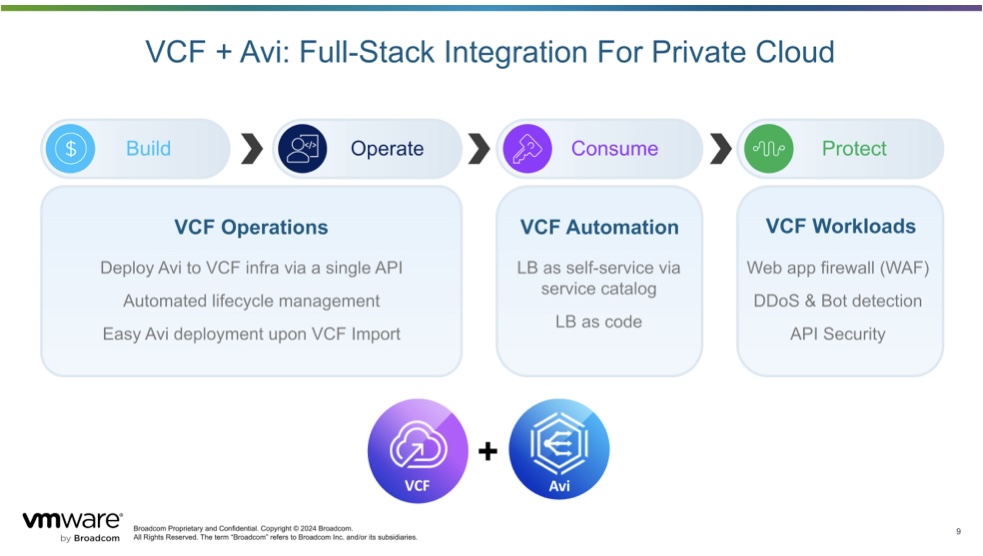
Key Capabilities and Enhancements:
- Unified Cloud Operating Model: Avi offers a unified API for infrastructure administrators and developers, enabling automated lifecycle management, self-service, elasticity (auto-scale and auto-heal), and efficient issue resolution with latency analytics. It includes local and global load balancing, Kubernetes ingress, and web application security, fully integrated with VCF.
- Consistent Experience for Admins and Developers: Load balancing can be utilized either through code or via self-service using VCF Automation and service catalog integrations. Multi-tenancy and VPC support facilitate resource isolation, providing granular control per tenant, along with simplified deployment for various topologies.
- Security and Application Resiliency: Avi integrates local and global load balancing, container ingress, and web application/API security. It includes Kubernetes ingress and Gateway API for VKS workloads, a centralized web application firewall (WAF), and global server load balancing (GSLB) for high availability across regions.
Avi Load Balancer offers plug-and-play load balancing for VM and Kubernetes workloads, with global server load balancing, application analytics, and web application firewall. VCF 9.0 introduces self-service load balancing, streamlined operations, and VPC-aware deployments.
Other new services include:
- VMware Private AI Foundation with NVIDIA: This joint solution enhances cybersecurity with air-gap support, offers GPU-as-a-Service with multi-tenancy, provides vGPU profile visibility, and improves GPU utilization and monitoring. Model Runtime simplifies model usage and scalability, while Agent Builder Service streamlines AI agent creation.
- VMware Live Recovery: Delivers unified cyber and disaster recovery management across VCF deployments, with increased data sovereignty through on-premises isolated recovery environments. Supports up to 200 immutable snapshots per VM and enables independent scaling of storage with vSAN clusters.
- VMware Data Services Manager (DSM): Supports enterprise PostgreSQL and MySQL, with Microsoft SQL Server in Tech Preview. Integration with VCF Automation enables database as a service (DBaaS), and new enhancements improve operational efficiency for large database fleets.




 Amazon
Amazon